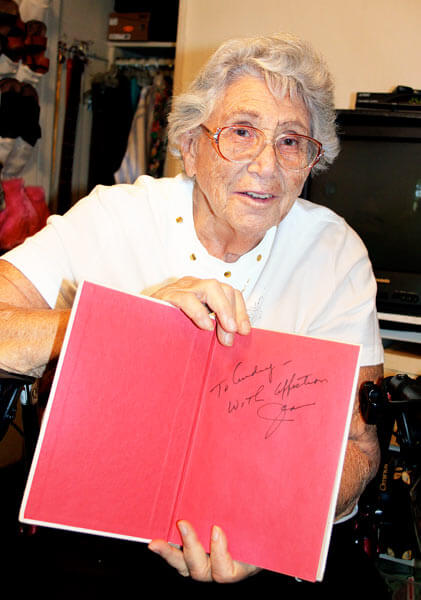By Rich Bockmann
Unless one considers Long Island and Queens to be different countries, the name “Weight Watchers International Inc” may not have seemed entirely apropos at the time when the company consisted of a few scattered meetings and a loft space near the corner of Northern Boulevard and Little Neck Parkway.
“When I added the word ‘International’ in 1963, the lawyer incorporating our little business laughed and shook his head. After all, we had only one rented space, in Little Neck, New York, where we held our classes,” the company’s founder wrote in her autobiography, “The Jean Nidetch Story.”
Weight Watchers’ 1.2 million members now hold more than 45 thousand meetings each week across the world — a far cry from its humble beginnings in the basement of Nidetch’s Deepdale Gardens home.
Audrey Huron, who still lives in the same Deepdale Gardens apartment she did 50 years ago, was one of the original members of Jean’s Group.
“I remember she came to me and asked if she could borrow some folding chairs. It was the neighborly thing to do,” she said. “Weight Watchers started in a house with 10 women and it just grew and grew and grew.”
Nidetch was born in Brooklyn and struggled with her weight since childhood, going back and forth between fad diets she picked up in newspapers and magazines and indulging herself in her favorite pastime: eating.
She and her husband, Marty, moved to the borough not long after their son David was born in 1951.
“We found an apartment in Deepdale Gardens in northeast Queens, on the border of Long Island (where many pronounce it Long Guy-Land). Well, there was little you could call ‘gardens’ and nothing in the way of a ‘dale,’ which I think still means ‘valley,’” she wrote.
“Deepdale Gardens was a new cooperative low-rise apartment complex covering 60 acres, built by the government as affordable housing for veterans of World War II. It was very family-friendly, with central laundry facilities, playgrounds for children, and free parking. It also had lawns and lots of trees, although not many were very tall,” she continued.
“We were living in the suburbs, and we had our own home. We were overjoyed. Did I mention that being overjoyed is an occasion for a feast?” Nidetch recalled, adding that not long after her second son, Richard, was born, she topped out an all-time high of 214 pounds.
In 1961 Nidetch traveled to the city Board of Health’s obesity clinic, where she was given a diet that prescribed two pieces of bread and two glasses of milk a day, fish five times a week and a weekly meal featuring liver.
What was not prescribed at the weekly clinic meetings — in fact it was frowned upon — was discussion among patients, something Nidetch yearned for.
So she invited seven friends to her living room for what she called “Jean’s Group” to share not only the diet but their experiences with food and eating.
“While the meetings were a place to talk about our common problems with food — and admit to ourselves by admitting to others that we were sneaking and gorging on fattening foods — I did most of the talking and admitting. I talked and talked and talked, and the more I talked, the more others started opening up with their own stories,” she wrote.
Word of the group spread, and one day Nidetch was invited to the Baldwin, L.I., home of Felice and Al Lippert, who offered to pay her $1 a week to speak to a group of about 20.
It was Al Lippert who convinced Nidetch to run her group as a proper business, and by 1969 the company had sold franchises in Canada, Puerto Rico, England, Scotland and Australia.
Huron said she called Nidetch at her home in Florida earlier last month to wish her a happy 88th birthday, and said she would like to see her friend’s legacy honored.
“She never got recognition for what she did,” Huron said. “Her whole idea was together we can lose the weight better than separately. Of course, it worked, that’s why there’s so many diet companies now.”
Reach reporter Rich Bockmann by e-mail at rbockmann@cnglocal.com or by phone at 718-260-4574.


































